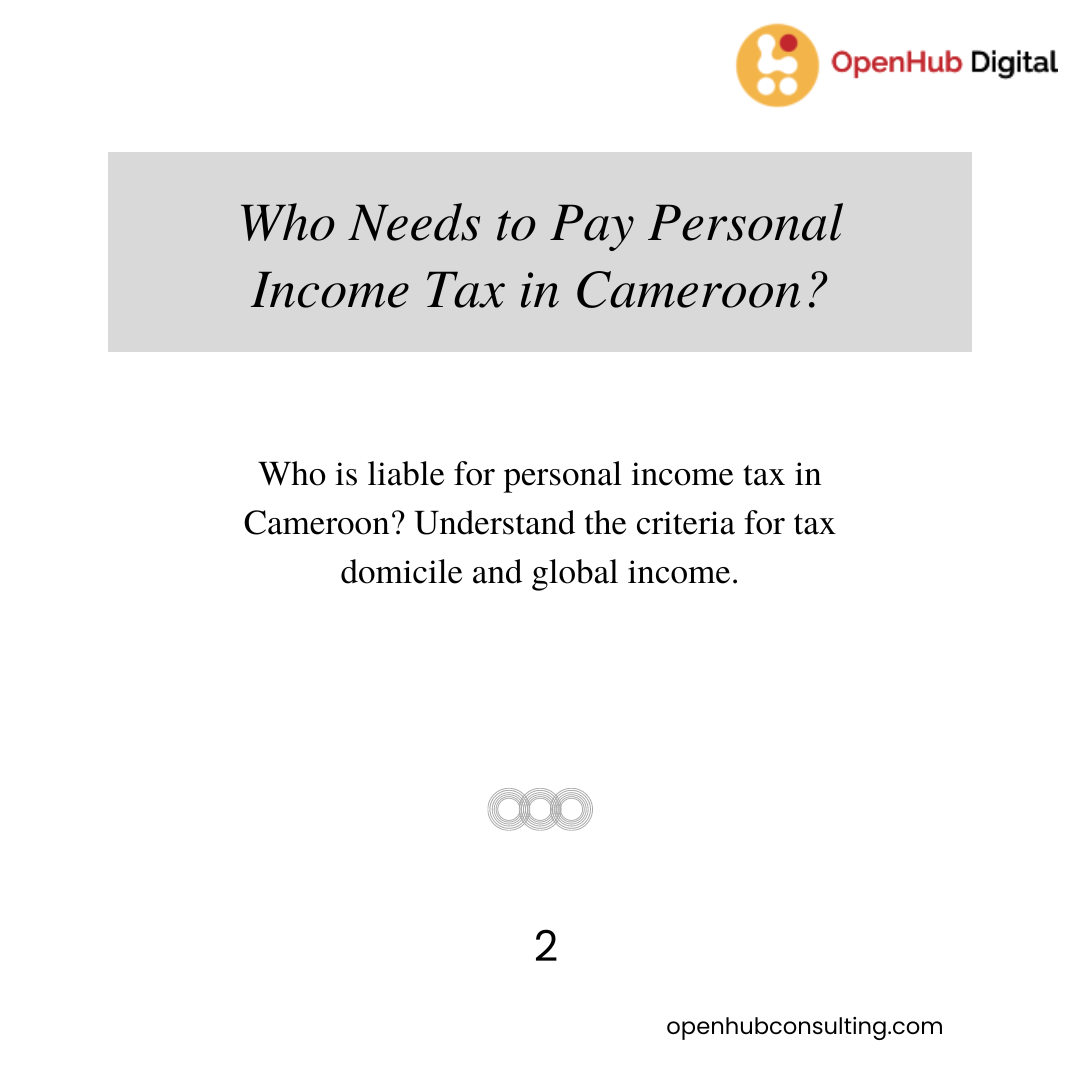In our previous post, we discussed understanding your tax obligations as a non-professional taxpayer. Now, let’s delve into who exactly needs to pay personal income tax in Cameroon and how tax liability is determined.
Who Needs to Pay?
According to Section 25 of the general tax code, personal income tax is payable by all individuals whose tax domicile is in Cameroon on their worldwide income. But what does this mean?
Determining Tax Domicile
Here’s how to determine if your tax domicile is in Cameroon:
If this article helped you, you can support our work at OpenHub.
Support OpenHub Digital- Residence: If you have a home or principal place of residence in Cameroon, you are considered to have your tax domicile here.
- Professional Activity: Individuals engaged in professional activities in Cameroon, whether salaried or non-salaried, are liable for personal income tax unless they can prove the activity is only secondary.
- Economic Interests: Those who have the core of their economic interests in Cameroon. This means if your main business or financial interests are based in Cameroon, you need to pay taxes here.
[sibwp_form id=2]
Special Cases
- Civil Servants Abroad: Civil servants or State employees working in foreign countries and exempt from taxes there are considered domiciled in Cameroon.
- Non-Residents: Persons whose tax domicile is outside Cameroon but who make profits in Cameroon are liable to pay personal income tax on those profits.
- International Conventions: Persons, whether Cameroonian or foreign, who earn profits taxable by Cameroon under international conventions to avoid double taxation must pay personal income tax.
- Diplomatic Staff: Staff of international organizations, diplomatic and consular missions not holding diplomatic status, are liable for personal income tax in Cameroon.
Partners in Partnerships
Section 26 states that partners in general partnerships and active partners in limited liability partnerships who do not opt for the company tax system are personally liable for personal income tax based on their share of the corporate earnings. This also applies to partners in non-trading companies, joint-ventures, and de facto firms not liable to company tax.
Example
Let’s clarify with an example:
- If you live in Douala and have your primary residence there, you are considered domiciled in Cameroon and must declare all your worldwide income.
- If you’re a Cameroonian working as a consultant in Yaoundé and earning income from this activity, you’re liable for PIT, regardless of whether you spend most of your time traveling outside the country for work.
Disclaimer
This content is for informational purposes only and should not be taken as tax advice. For personalized assistance, consult a tax professional.
Next Steps
In our next post, we’ll explore who is exempt from PIT in Cameroon. Stay tuned!
For professional assistance in company registration, tax declaration, and more, visit OpenHub Consulting. We help start, run, and grow businesses in Cameroon with services like sales and marketing, bookkeeping, and accounting for small businesses.
Got questions? Ask away in the comments or revisit our previous post here.
Previous Post: Understanding Your Tax Obligations as a Non-Professional Taxpayer
Next Post: Who Is Exempt from Personal Income Tax in Cameroon?
From Insight to Implementation
Going through the administrative and legal landscape in Cameroon requires more than just information—it requires a grounded local partner. At OpenHub Consulting, we specialize in helping the diaspora and international investors turn their business visions into compliant, operational realities.
If you are ready to move forward, our team is prepared to manage your registration and compliance from start to finish.
Start Your Company Incorporation →Discover more from OpenHub Digital
Subscribe to get the latest posts sent to your email.

